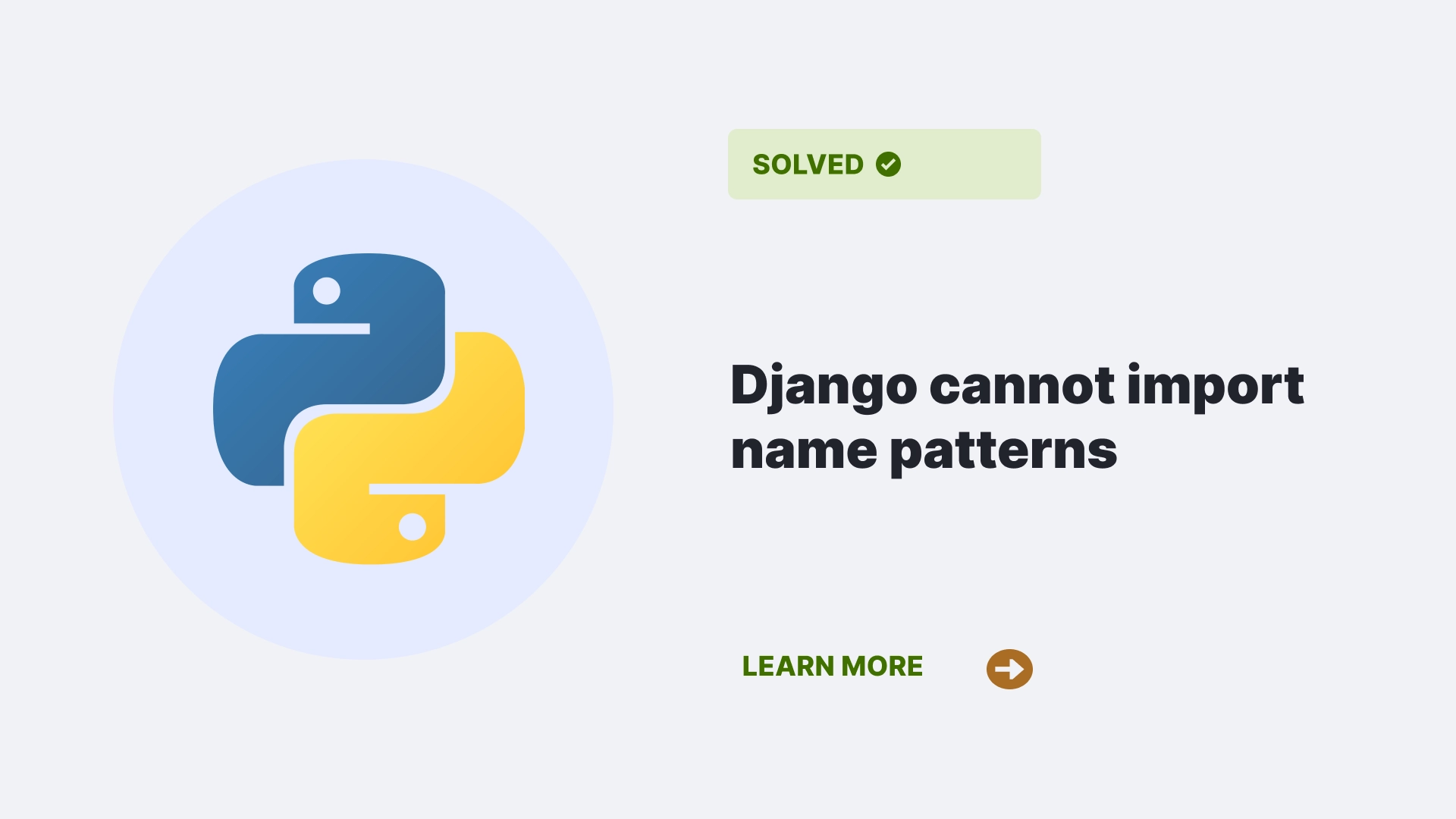A common error error that developers may encounter while dealing with Django is the “Django cannot import name patterns” error. Django, a high-level Python web framework, is renowned for its simplicity and flexibility. However, like any technology, it is not immune to errors. In this article, we’ll delve into the specifics of this error, exploring its causes and providing a comprehensive guide on resolving it.
Contents
What is the “Django cannot import name patterns” error?
When developing web applications with Django, encountering the “Django cannot import name patterns” error can be perplexing, potentially causing frustration for developers. This error message surfaces when there’s a hitch in importing the ‘patterns’ module, a critical element in crafting URL patterns within the Django framework.
In Django, URL patterns are fundamental to routing user requests to the appropriate views. These patterns are defined within the ‘urls.py’ file of a Django app and play a crucial role in leading the application. The ‘patterns’ module was commonly employed to structure these URL patterns until it was deprecated in newer Django versions.
As developers, you might have encountered scenarios where a Django project relies on the organization of URLs through the ‘patterns’ module. However, due to changes in Django’s best practices and the framework’s evolution, sticking solely to the ‘patterns’ module may lead to compatibility issues, resulting in the “Django cannot import name patterns” error.
What causes the “Django cannot import name patterns” error?
Circular Imports
Circular imports are a common cause of the “Django cannot import name patterns” error. This occurs when two or more modules depend on each other, creating a loop the interpreter cannot resolve. Circular imports can be tricky to identify, especially in larger projects.
Let’s consider an example where ‘urls.py’ in the ‘myapp’ module imports ‘patterns’ from ‘views.py’, and ‘views.py’ imports ‘urls.py’. This circular dependency can lead to the error in question.
!pip install django
from django.urls import path
urlpatterns = [
# URL patterns go here
]
!cat myapp/urls.py
# myapp/urls.py
from myapp.views import my_view # Circular import
urlpatterns = patterns('', # Error occurs here
# URL patterns go here
)
# myapp/views.py
from myapp.urls import urlpatterns # Circular import
def my_view(request):
# View logic
passIn this example, attempting to import ‘patterns’ in ‘urls.py’ triggers the error because it is not yet defined due to the circular import.
Deprecated Functionality
Another cause of the “Django cannot import name patterns” error can be the use of deprecated functionality. In older versions of Django (before version 1.10), the ‘patterns’ function was used to define URL patterns. However, this function has been deprecated in favor of the ‘urlpatterns’ list.
If your codebase relies on an outdated version of Django or if you are following outdated tutorials, you may encounter this error.
# Deprecated usage (Django version < 1.10)
from django.conf.urls import patterns
urlpatterns = patterns('', # Error occurs here
# URL patterns go here
)To resolve this issue, you need to update your code to use the ‘urlpatterns’ list, which is recommended in recent Django versions.
How do we resolve the “Django cannot import name patterns” error?
Now that we’ve identified some common causes of the “Django cannot import name patterns” error let’s explore how to resolve this issue.
Resolving Circular Imports
To address circular imports causing the “Django cannot import name patterns” error, consider restructuring your code to eliminate the circular dependency. One effective approach is to move the import statements to the end of the file, where all necessary components are already defined.
from django.conf.urls import patterns
# myapp/urls.py
urlpatterns = patterns('',
# URL patterns go here
)
from myapp.views import my_view # Move import to the end
By placing the import statement at the end, you ensure the required components are already defined, mitigating the circular import issue.
Updating Deprecated Functionality
If your code relies on deprecated functionality, the solution is to update it to use the recommended ‘urlpatterns’ list. This is especially important if you work with a Django version 1.10 or later.
# Updated usage (Django version >= 1.10)
from django.conf.urls import url
urlpatterns = [
url(r'^my-url/$', my_view, name='my-view'),
# Add more URL patterns as needed
]Replace the deprecated ‘patterns’ function with the ‘urlpatterns’ list, and use the ‘url’ function to define individual URL patterns.
FAQs
Can I use ‘patterns’ and ‘urlpatterns’ in the same project?
It is not recommended to use both ‘patterns’ and ‘urlpatterns’ in the same project, as this often lead to confusion which in turn causes potential errors. Stick to the ‘urlpatterns’ list for consistency and compatibility with newer Django versions.
I’ve checked for circular imports, but the error persists. What should I do?
Double-check your entire codebase for any circular dependencies. Circular imports might not always be direct; they can involve multiple files. Use tools like Pylint or Mypy to identify potential circular dependencies.
Conclusion
In conclusion, the “Django cannot import name patterns” error is often a result of circular imports or the use of deprecated functionality. For the smooth functioning of your Django project identifying and solving this error is a crucial part.
Remember to stay updated with the latest and best practices to avoid such issues in the future. If you encounter this error while coding, you can trust the steps mentioned in this guide, and use them, and you’ll be back to building robust web applications with Django in no time.

